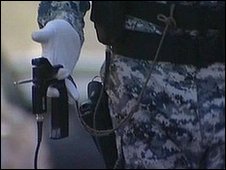
The ADE-651 is still in use at checkpoints in Baghdad
|
Some Iraqi officials are insisting that a controversial bomb detection device works, despite a BBC inquiry in which experts said the item was useless. Britain has banned exports of the ADE-651 and the director of the company selling them was arrested and bailed. But the device is still being used at checkpoints all over Baghdad. Interior Minister Jawad al-Bolani, whose department bought $85m of the devices, said the ADE-651 had detected 16,000 bombs, including 700 car bombs. "The thing is, the instrument is being operated by a user," he said. "Not all those who use the instrument are fully trained, the user needs to be alert and adept at using it." There are allegations that failure of the ADE-651 may have been a factor allowing suicide truck bombs to pass through checkpoints on three occasions last year, leading to hundreds of deaths. Iraqi investigations Jim McCormick, director of Somerset-based ATSC, which sold the device, says it uses special electronic cards slotted into it to detect explosives.
But a BBC Newsnight investigation reported that a computer laboratory said the card it examined contained only a tag used by shops to prevent theft. Several investigations into the use of the device are under way in Iraq. One has been ordered by Prime Minister Nouri Maliki, whose office has been told not to comment until the results are known. The Security and Defence Committee of the Iraqi parliament is also looking into the affair, and it will be discussed in the full chamber. 'Rival companies' But the interior ministry is still standing by the device. Jawad al-Bolani said on Friday: "There are a lot of companies working on the development of these sort of instruments and Iraq is now considered a market area for companies producing such devices. "It is a business, the business of security. And there are other rival companies trying to belittle the efficiency of these instruments the government is buying." General Jihad al-Jabiri, head of the ministry's counter-explosives department, told BBC Arabic TV that the ministry had sent 14 officers to Beirut for training by the company that produces these devices. "We conducted several tests on them, and found them successful," the general said. "In addition, we have a series of achievements officially documented by the Baghdad operations centre, from all the provinces, which establish that these devices detected thousands of bombs, booby-trapped houses and car bombs, and we've noticed a reduction of bombing activities to less than 10 per cent of what it was." However, the ministry's inspectorate told the BBC's Jim Muir, in Baghdad, that it was carrying out its own investigation into suspicions that corruption was involved in the deal to import the devices. 'Absolutely immoral' Newsnight obtained a set of cards for the ADE-651 and took them to Cambridge University's Computer Laboratory where Dr Markus Kuhn dissected a card supposed to detect TNT.

Jim McCormick was arrested on suspicion of fraud, and later bailed
|
It contained nothing but the type of anti-theft tag used to prevent stealing in high street stores. Dr Kuhn said it was "impossible" that it could detect anything at all and that the card had "absolutely nothing to do with the detection of TNT". Sidney Alford, a leading explosives expert who advises all branches of the military, told the BBC programme the sale of the ADE-651 was "absolutely immoral". "It could result in people being killed in the dozens, if not hundreds," he said. Meanwhile, the Associated Press news agency reported that in June 2009, the US military distributed a study using laboratory testing and X-ray analysis that found the ADE-651 ineffective. "The examination resulted in a determination that there was no possible means by which the ADE-651 could detect explosives and therefore was determined to be totally ineffective and fraudulent," Major Joe Scrocca, a US military spokesman in Baghdad, told AP in an e-mail. 'Refused to tell secret' Mr McCormick, 53, was detained on Friday on suspicion of fraud by misrepresentation, British police said. He has since been bailed. Another explanation for the current controversy came from a senior Iraqi interior ministry official, Assistant Deputy Minister General Tareq al-Asl, interviewed by the newspaper al-Sharq al-Awsat. "The reason the director of the company was arrested was not because the device doesn't work, but because he refused to divulge the secret of how it works to the British authorities, and the Americans before them," the general was quoted as saying. "I have tested it in practice and it works effectively and 100% reliably."
|
Bookmark with:
What are these?